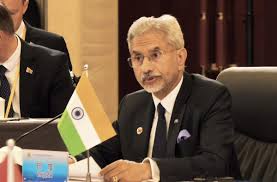Jaishankar meets Xi, reminds SCO of need to combat terror, separatism

Beijing, July 15, 2025 – External Affairs Minister S. Jaishankar met Chinese President Xi Jinping on the sidelines of the Shanghai Cooperation Organisation (SCO) Foreign Ministers’ Summit. This marked the first high-level India-China meeting in China since the 2020 Galwan clash. While diplomacy took center stage, Jaishankar used the SCO platform to send a strong message on terrorism, extremism, and separatism.
Diplomatic Reset with China
Jaishankar conveyed greetings from President Droupadi Murmu and Prime Minister Narendra Modi. He discussed regional and bilateral concerns with Xi, highlighting the need for stable ties.
Chinese media described the meeting as a “Dragon-Elephant Tango,” suggesting both countries could reshape the global order by working together. However, Indian officials cautioned that real progress would depend on resolving issues at the Line of Actual Control (LAC).
India’s Firm Message at the SCO
At the SCO Foreign Ministers’ Conference, Jaishankar reminded member states of the bloc’s original mission. He stressed that the SCO was formed to combat the “three evils” — terrorism, separatism, and extremism.
Without naming Pakistan, Jaishankar made clear references to countries that support terror networks. “There can be no compromise on terrorism,” he said. He cited the April 22 Pahalgam attack as an example where all three threats merged.
According to him, the attack was meant to destabilize Kashmir’s growing tourism and provoke communal tensions. He warned that India has responded strongly and added, “Countries that shelter or justify terrorism will be held accountable.”
Regional Stability and Economic Integration
Beyond security concerns, Jaishankar pushed for stronger regional cooperation. He emphasized the need to support the International North-South Transport Corridor (INSTC), which connects South Asia with Central Asia, Russia, and Europe.
He also urged SCO nations to assist in Afghanistan’s development. “Afghanistan’s stability is vital to the entire region,” he said. “The SCO must work together to prevent a return to chaos.”
Balancing Engagement and Assertiveness
India’s approach reflects a diplomatic balance. While it seeks better ties with China, it also remains firm on its core concerns. Jaishankar’s outreach shows that India is open to dialogue but unwilling to compromise on security.
At home, the government’s tough stance on terrorism aligns with national sentiments. Security remains a top priority, especially with elections nearing in several states.
Meanwhile, opposition leader Rahul Gandhi criticized the visit. He called it a “diplomatic circus,” claiming the government is using global events to distract from domestic issues.
Looking Ahead
Despite the positive optics, major challenges remain. Disengagement along the LAC is incomplete. Trust between India and China still needs rebuilding.
Still, the fact that the meeting took place at all signals some willingness to move forward. At the SCO, Jaishankar’s call for zero tolerance on terror found support among several Central Asian members.
India is shaping its role within the SCO. It aims to strengthen regional security, boost economic cooperation, and promote development. The message is clear: India is ready to engage, but on its own terms.






